上海版牛津英语6A知识点整理
沪教版6A牛津英语期末知识点整理

目录第一部分:课文要点回首 (2)Unit 1 Family and relatives (2)Unit 2 I have a good friend (3)Unit 3 Spending a day out together (5)Unit 4 What would you like to be? (6)Unit 5 Open day (7)Unit 6 Going to school (8)Unit 7 Rules round us (9)Unit 8 The food we eat (10)Unit 9 Picnics are fun (11)Unit 10 Healthy eating (12)第二部分:上海牛津英语6A 短语总汇 (13)第三部分:改写句子常考整理 (16)第四部分:语法点索引 (18)1、疑问词 (18)2、必背不行数名词 (21)3、神态动词 (21)4、不定代词 (22)5、介词 (23)6、时态 (25)第一部分:课文要点回首Unit 1 Family and relatives1. This is my grandfather. 这是我的(外)祖父。
These are my family and relatives. 这些是我的家人和亲戚。
注意句中各成分保持单复数同形。
2.I?m their son.. 我是他们的儿子。
We’re their sons.我们是他们的儿子。
3.sth. from sb. 某物来自某人。
This is a birthday card from my friend. 这是一张来自我朋友的诞辰卡片。
4. Happy birthday to sb. 祝某人诞辰快乐。
5. one of your family members你的家庭成员之一。
6. How many uncles do you have? 你有多少个叔叔?one of 后边应接可数名词的复数形式。
上海版牛津英语6A知识点整理
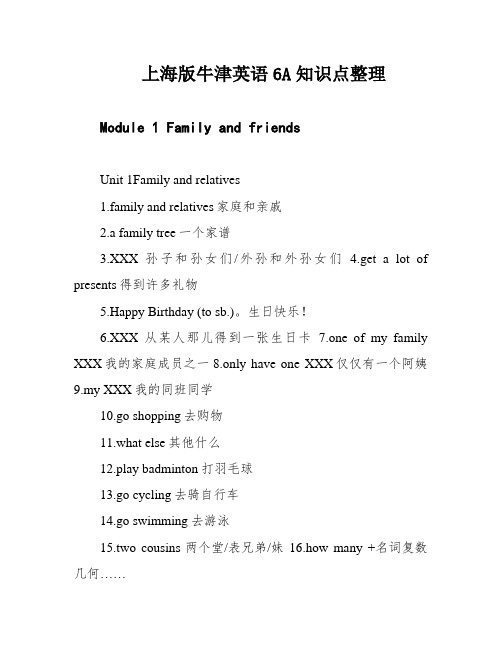
上海版牛津英语6A知识点整理Module 1 Family and friendsUnit 1Family and relatives1.family and relatives家庭和亲戚2.a family tree一个家谱3.XXX孙子和孙女们/外孙和外孙女们4.get a lot of presents得到许多礼物5.Happy Birthday (to sb.)。
生日快乐!6.XXX从某人那儿得到一张生日卡7.one of my family XXX我的家庭成员之一8.only have one XXX仅仅有一个阿姨9.my XXX我的同班同学10.go shopping去购物11.what else其他什么12.play badminton打羽毛球13.go cycling去骑自行车14.go swimming去游泳15.two cousins两个堂/表兄弟/妹16.how many +名词复数几何……语言点1.This is my XXX.这是我的(外)祖父。
These are my family and relatives.这些是我的家人和亲戚。
留意句中各身分坚持单复数同形。
2.I‟m their son。
我是他们的儿子。
We‟re their sons.我们是他们的儿子。
3.How many uncles do you have?你有几何个叔叔?How many背面接可数名词的复数方式。
4.What do you do with your…?你和你的…干什么?5.What else do you do with your…?你和你的…还干什么?6.What else do you do with your…?你和你的…还干甚么?With是个介词,背面接人称代词时,要用宾格的形式。
With me/him/her/it/us /them7.always/sometimes/usually是频度副词,发问应当要用How often…?Unit 2I have a good friend1.help each other互相帮助2.help other people = help XXX匡助他人3.not…at all根本不4.go out at night在早晨进来5.like to be XXX喜欢在一起6.XXX7.be friendly8.XXX9.work hard = study hard10.be late for school11.get angry12.be kind to others13.XXX.14.XXX15.XXX16.a visit to sp.17.live in the USA = live in America18.visit sp。
牛津沪教版六年级上6AUnit1-Unit2重要知识点复习
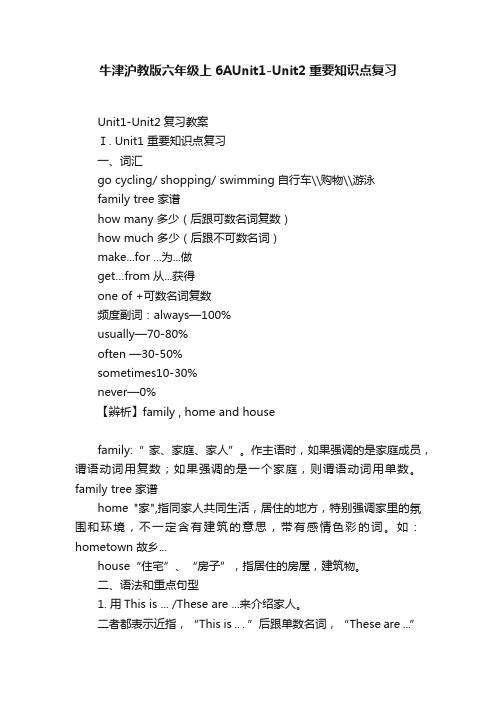
牛津沪教版六年级上6AUnit1-Unit2重要知识点复习Unit1-Unit2复习教案Ⅰ. Unit1 重要知识点复习一、词汇go cycling/ shopping/ swimming自行车\\购物\\游泳family tree 家谱how many 多少(后跟可数名词复数)how much 多少(后跟不可数名词)make...for ...为...做get…from从...获得one of +可数名词复数频度副词:always—100%usually—70-80%often —30-50%sometimes10-30%never—0%【辨析】family , home and housefamily:“ 家、家庭、家人”。
作主语时,如果强调的是家庭成员,谓语动词用复数;如果强调的是一个家庭,则谓语动词用单数。
family tree 家谱home "家",指同家人共同生活,居住的地方,特别强调家里的氛围和环境,不一定含有建筑的意思,带有感情色彩的词。
如:hometown 故乡...house“住宅”、“房子”,指居住的房屋,建筑物。
二、语法和重点句型1. 用This is ... /These are ...来介绍家人。
二者都表示近指,“This is .. . ”后跟单数名词,“These are ...”后跟复数名词或者多个不同的对象。
2.用how many 来询问数量后接可数名词的复数形式,当我们提问你有多少……时候,如果How many后跟人,常用how many... do you have?如果How many 后跟物,常用how many...have you got?3.What do you do with your... ? 和What else do you do with your... ? 来提问与家庭成员或亲戚一起做什么.else 意为别的其他的,常用于特殊疑问词或不定式之后,如what else, something else等。
6A上海牛津英语六年级第一学期重点词组和句型
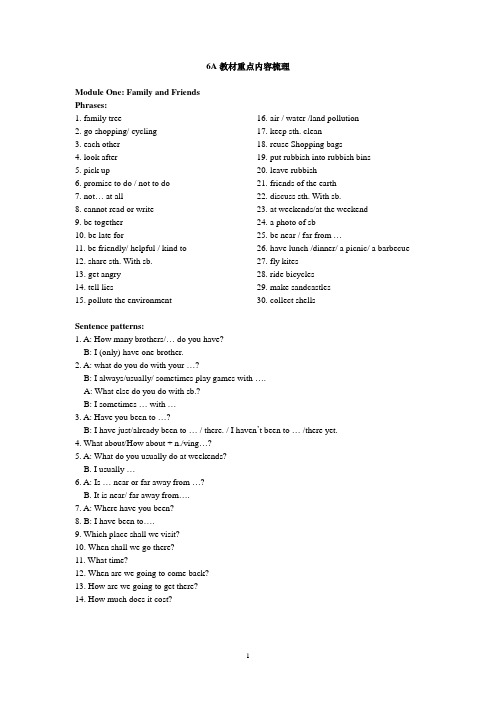
6A教材重点内容梳理Module One: Family and FriendsPhrases:1. family tree2. go shopping/ cycling3. each other4. look after5. pick up6. promise to do / not to do7. not… at all8. cannot read or write9. be together10. be late for11. be friendly/ helpful / kind to12. share sth. With sb.13. get angry14. tell lies15. pollute the environment 16. air / water /land pollution17. keep sth. clean18. reuse Shopping bags19. put rubbish into rubbish bins20. leave rubbish21. friends of the earth22. discuss sth. With sb.23. at weekends/at the weekend24. a photo of sb25. be near / far from …26. have lunch /dinner/ a picnic/ a barbecue27. fly kites28. ride bicycles29. make sandcastles30. collect shellsSentence patterns:1. A: How many brothers/… do you have?B: I (only) have one brother.2. A: what do you do with your …?B: I always/usually/ sometimes play games with ….A: What else do you do with sb.?B: I sometimes … with …3. A: Have you been to …?B: I have just/already been to … / there. / I haven’t been to … /there yet.4. What about/How about + n./ving…?5. A: What do you usually do at weekends?B. I usually …6. A: Is … near or far away from …?B. It is near/ far away from….7. A: Where have you been?8. B: I have been to….9. Which place shall we visit?10. When shall we go there?11. What time?12. When are we going to come back?13. How are we going to get there?14. How much does it cost?Module Two: Places and Activities Phrases:1. a bank clerk2. a shop assistant3. put out fires4. cook food5. make our city a safe place6. look at7. listen to8. arrive at9. have tea10. at the entrance11. on the ground/ first floor12. on the open day13. at half past eight in the morning14.First,../ Next,…/Then,…/After that,…/Finally, …15.take photos16. by ferry/ by underground/ on foot17. on the bus 18. go to school19. a lot of/ some/ a few20.live near/far away from school21.an advertisement board22. light rail23. a department store24. a housing estate25. a police station26. half an hour27. wait for28. walk on the grass29. keep quiet30. run across the road31. pick the flowers32. turn left/right33. on the right/left34. in the middle35. go upstairsSentence patterns:1.A: Would you like to be a/an…?B: Yes, I would.//No, I wouldn’t.A: Why?/Why not?B: I would /wouldn’t like to be a/an…because I…2.A: What would you like to be?B: I would like to be…3.A: Do you live near or far away from …?B: I live near/far away from ….A: How do you go to school?B: I go to school by…/on foot.A: How long does it take?B: It takes …4.A: How long does it take you to get to…?B: It takes me about…to get there.5.A: What does Simon see when he is walking to school?B: Simon sees ...when he is walking to school.6. What does this sign mean?7. We must not eat or drink./Don’t eat or drink.8. We must …9. A: Which escalator must we use?B: We must use the one in the middle.Module Three: Food and Drink phrases1. fried cabbage/chicken wings2. steamed prawns with garlic3. boiled eggs4. a shopping list5. at the vegetable stall6. in the frozen food section7. in the market/supermarket8. have a picnic9. a bottle of jam10. a packet of nuts11. a slice / slices of 12. an unhealthy diet13. do exercise14. live in the countryside15. stay with sb.16. plenty of / a lot of17. a little/ some18. my favourite breakfast19. too much spicy food20. eating habits21.the food pyramidSentence patterns:1.A: What would you like for dinner tonight?B: I’d like … for dinner.A: What kind of … would you like?Would you like … or …?B: I’d like…2.A: Have you bought any…?B: Yes, I’ve bought some…A: Where did you buy it/them?B: In the market, at the…stall/in the…section.A: How much was it/were they?B: It was /They were…yuan.3.A: Shall we buy some soft drinks?B: Ok./ That’s a good idea.4.Let’s buy some bread and a bottle of jam.Let’s go to the supermarket to buy some food and drink for the picnic.5.A: Would you like some…?B: No, thanks / yes, please6.A: Why do you like…?B: I like it/them because it’s/they’re sweet/delicious/tasty/spicy.7.A: Why not?B: I don’t want … because it is too ….8.A: May I have some …, please?B. Ok/ Sure/ All right/ Yes, you may. Here you are.//NO, you may not./ I’m afraid you can’t..9.A: How much sugar do we need every day?B: We need a little sugar every day.10.A: Which one was healthier/less healthy?B: …’s diet was healthier than/less healthy than/as healthy as/as unhealthy as …’s diet.11.How much … do we need?12.What do you usually have for breakfast/ lunch /dinner?13.A: What did you have for breakfast yesterday?。
牛津上海六年级英语知识点
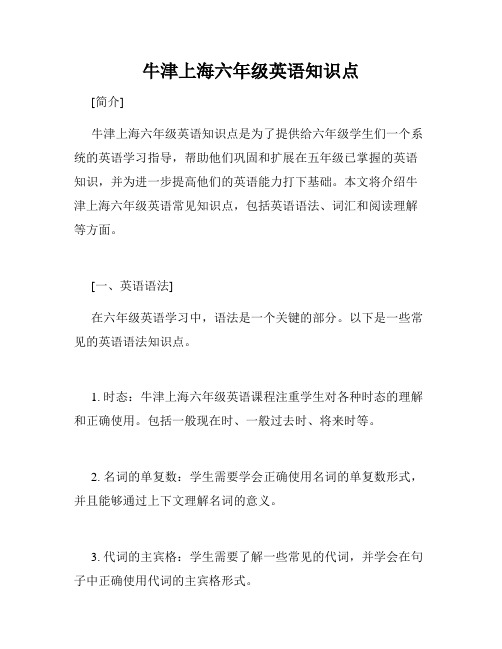
牛津上海六年级英语知识点[简介]牛津上海六年级英语知识点是为了提供给六年级学生们一个系统的英语学习指导,帮助他们巩固和扩展在五年级已掌握的英语知识,并为进一步提高他们的英语能力打下基础。
本文将介绍牛津上海六年级英语常见知识点,包括英语语法、词汇和阅读理解等方面。
[一、英语语法]在六年级英语学习中,语法是一个关键的部分。
以下是一些常见的英语语法知识点。
1. 时态:牛津上海六年级英语课程注重学生对各种时态的理解和正确使用。
包括一般现在时、一般过去时、将来时等。
2. 名词的单复数:学生需要学会正确使用名词的单复数形式,并且能够通过上下文理解名词的意义。
3. 代词的主宾格:学生需要了解一些常见的代词,并学会在句子中正确使用代词的主宾格形式。
4. 形容词和副词的比较级和最高级:学生需要学习形容词和副词的比较级和最高级形式,并能够正确运用于句子中。
5. 动词的不定式和动名词:学生需要学会区分动词的不定式和动名词形式,并且能够根据上下文理解其使用方式。
[二、英语词汇]在六年级英语学习中,词汇的掌握是非常重要的。
以下是一些常见的英语词汇知识点。
1. 基础词汇:学生需要熟练掌握一些常见的英语单词,包括表示人物、动物、食物等方面的词汇。
2. 时钟时间:学生需要学会用英语表达时间,并且能够读懂时钟上的时间。
3. 季节和月份:学生需要学会用英语表达四季和十二个月份,并且能够通过上下文理解相关的词汇。
4. 数字和计数:学生需要学会用英语表达数字,并且能够正确计数。
5. 学科词汇:学生需要学会一些与学科相关的词汇,比如数学、科学、地理等。
[三、阅读理解]在六年级英语学习中,阅读理解是培养学生阅读能力和理解能力的重要环节。
以下是一些常见的阅读理解知识点。
1. 阅读短文:学生需要学会阅读简短的英语短文,并且能够通过阅读内容回答问题。
2. 理解问题:学生需要根据短文内容,理解问题的意思,并能够准确回答问题。
3. 推理判断:学生需要通过上下文理解短文中的隐含信息,并能够进行推理判断。
上海牛津六年级上6A各单元知识梳理

预初期末复习Module 1 Unit 1 family and relatives 单元重点1.关键词汇Relative :grandfather, grandmother, grandson, granddaughter, uncle, aunt, cousinFamily tree, family members :father, mother, son, daughter, brother, sisterplay games/football/badminton ;go shopping/swimming/cycling ;go to a restaurant/the park ;watch TV/a film ,only ,else ,classmate2.语言功能Asking for information 询问信息1)A :How many + 名词复数+ do you have ?B :I only have one……/ I have (number)……2)A :What (else)do you do with your + 名词?B :I always / usually / sometimes / never do sth. with my + 名词Introduction 介绍:This is ……/ These are ……Express good wishes 表示祝愿:Happy birthday !3. 语法要点1)频度副词always ,usually ,often ,sometimes 和never 在一般现在时中的用法:放在be 动词、助动词后面,放在行为动词前面。
She is often late for school .When do you usually do in the morning ?He usually goes to bed in the morning .1. 主格做主语,放在句首:I often go to the supermarket . (me)2. 宾格做宾语,放在动词、介词的后面:I sometimes go shopping with him (he)3. 形容词性物主代词做定语,放在名词前面:后面必须加名词Our classroom is very big and clean. (we)4. 名词性物主代词做主语、宾语、表语:后面不能加名词Is this her T shirt ?No ,hers is red . (she)That new flat is ours . (we)3) 一般现在时:主语除了是三单主语是第三人称单数I go to school on foot . She goes to school on foot .I don’t go to school on foot . She doesn’t go to school on foot .Do you go to school on foot ?Does she go to school on foot ?Yes ,I do . / No ,I don’t Yes she does . / No ,she doesn’t动词变化①以s ,x ,ch ,sh ,o结尾+es ;②以辅音字母+y结尾,去y+ies ;③have…hasModule 1 Unit 2 I have a good friend 单元重点1.关键词汇词性转换:friend n. ……friendly a. ……friendship n.help n. v. ……helpful a. ……helpless a.kind a. ……kindness n. ……kindly ad.pollute v. ……pollution n.discuss v. ……discussion n.use v. ……reuse v. ……useful a. ……useless a.angry a. ……angrily ad. ……anger n.visit n. v. ……visitor n.词组:talk to/with sb talk about sth = discuss sthlike to do/doing enjoy doingevery day every night/morning/afternoongo out at night walk to school = go to school on footbe together play togethereat one’s lunch share one’s foodhelp each other each other = one anotherhelp other people other people = othersbe late for ask sb about sthwork hard be kind toget angry get coldshare sth with sb tell lieslive in the USA visit Garden Cityfor the first time on Saturdaya friend of the Earth pick up rubbishlook after = take care of = care for all the things around uspollute the environment air/land/water/noise pollutionkeep ……clean keep + adj; keep quiteput rubbish into rubbish bins leave rubbishtell sb to do ; tell sb not to do ask , invite , allow , want sb not to dowant to be want/agree/decide/hope/offer/try/manage + to do promise to do ; promise not to do discuss sth with sb2.语言功能1)A :Thank you! B :Not at all./ You’re welcome./ It’s a pleasure./ That’s all right.2) A :We want to look after the environment . B :All right .3.语法要点1)We like to + v ……together2)be + adj :She is always naughty/clever/friendly/helpfui比较:She always gets angry . She never tells lies.3) A:Where have you been ? B:I have been to ……A:Have you been to ___________yet?B: yes, I have just /already been to ______./Y es , I have just /already been there.No, I haven’t been to ______yet. / no, I haven’t been there yet.4) we promise to .../we promise not to ..Module 1 unit3 spending a day out together1. 关键词汇词性转换happy a.------- happily ad. -------unhappy a.sand n. ---------sandy a.sun n. -------sunny a.cloud n.-------- cloudy a. wind n. ------windy a.rain n. ------rainy a. snow n. ------snowy a.luck n. ------lucky a. ------luckily ad. ------ unlucky a.act v. ------activity n. ------ actor n. ------ actress n. ------action n.collect v. ------ collection n.important a. ------importance n.special a. ------specially ad.词组:At weekends= at the weekend on weekdaysBe far away from be nearIn sandy bay/ sunny town on lucky islandCome with sb space museumA photo of me the students of class threeBuy tickets eat ice creamHave a barbecue/a picnic/lunch/dinner spend a holidayFly tickets ride bicycles= cycleMake sandcastle collect shellsMake an album come backPlan a visit plan to do sthCome back make some notesGet there get to ShanghaiMy sixtieth birthday her ninth birthdayHave a big birthday party have a good time = enjoy oneselfPlay with sb get enough food for the party2. 语言功能1)A: Let’s go to Ocean Park . B : That’s a good idea./All right.2)A: Where have you been in -----? B: I have been to ----in---with sb3) A: Which place shall we visit? B: Shanghai MuseumWhen shall we go there ? On SaturdayWhat time ---? 9 o’clockHow are we going to get there ? By undergroundHow much does it cost? = How much is it ?How much do they cost ? = How much are they ?3. 语法要点1) 表示建议How about + n/doing? How about playing badminton?What about + n/doing? What about playing badminton?Why not + do ? Why not play badminton.Why don’t you + do? Why don’t you play badminton?Let’s + do . Let’s play badminton.2) 现在进行时表示说话正在发生的动作或目前这一阶段正在进行的动作’s nine.搭配Module 2 Unit 4 What would you like to be 单元重点1词性转换:secret a.-------secretary n .teach n.-------teacher n .drive n.-------driver n .work v .------worker n .safe n .a.-----safely ad.------safety a.fire n.-------fireman n.post .v.-----postman n. ----postage n-----poster ncook v.------cook n.-------cooker n.2词组:1.find out Please find out who broke the window .find At last he found his English book.look for Alice is looking for her new watch .2.interview sb interview her3.start work4.finish work5.put sth together6.stick sth on a display board7.in the morning/afternoon/eveningOn a cold morning on Sunday afternoon/on the evening of July 18.make our city a safe placemake sth for sb =make sb sth make a cake for us =make us a cakemake sb+adj. make me happy9.eight years old3.语言功能A.表达愿望(wishes)Would you like to be a policeman ?—Yes, I would./ No, I would not.B. 陈述原因(give reasons)Why……?Because……4.语法要点:A.I’d=I would ; would not =wouldn’tB. would like to 与want to 的转换I would like to be a nurse .=I want to be a nurse.I wouldn’t like to be a nurse.=I don’t want to be a nurse .Would you like to be a nurse ?=Do you want to be a nurse ?She would like to be a nurse.=She wants to be a nurse .She wouldn’t like to be a nurse.=She doesn’t want to be a nurse .Would she like to be a nurse?=Does she want to be a nurse ?5.职业A cook cooks food for people.A secretary takes notes and answers phones.A dentist looks after people’s teeth.A doctor makes sick people better.A nurse helps make sick people better.A pilot flies a plane.A shop assistant sells things to people.A factory worker makes things in a factory.A fireman puts out fires.A bank clerk receives money and gives money in a bank.Module 2 Unit 5 Open Day 单元重点1.词性转换:1. enter v.----------entrance n.2. music n. -------musical a.3.final a.--------finally ad.4.invite v.------invitation n.5.act v.--------activity n.6. different a.----difference n.2.词组:1.arrive at (小)in(大)+地点get to +地点到达某地Arrive at school arrive in Shanghai get to Shanghai reach Shanghai比较:arrive home/here/there get home reach home2.meet sb at +地点meet Mary at the entrance3.visit sb/sp. Visit Mr. Wang/visit Beijing4.look at sb/sth look at class project/look at me5.listen to sb/sth listen to him /listen to the music6.the Arts and Crafts room English club noticeboard7.in the library in the hall in the music room in classroom 6A8.have tea and cakes9.want sb to do sth want us to make notes10.welcome sb welcome the parents11.on the open day 12.in different places13.on the second floor 14.teachers’office15. invite sb to do sth invite Lily to have a picnic16.take some photos complete the article17. have a good time =have a great time =enjoy oneself=enjoy one’s time3.语言功能:A.询问信息(Asking for information)--When What time Where WhatWhere will kitty be? Kitty will be in the music room.B.用副词表达事情得进展顺利。
上海牛津英语6A笔记

1.relative 〔’relətiv〕n. 亲属、亲戚2.a family tree 家谱3.family 〔’fæmili〕n. 家、家人families (复数)4.this → thesethat → those5.grandfather 〔’grænd, fa:ðə〕n. 祖父、外祖父6.grandmother 〔’grænd, mʌðə〕n. 祖母、外祖母7.an uncle 〔’ʌŋkl〕伯父、叔叔、舅舅8.an aunt 〔a:nt〕姑母、姨妈、阿姨9.brother 〔’brʌðə〕n. 兄弟sister 〔’sistə〕n. 姐妹10.cousin 〔’kʌzən〕n. 堂(表)兄弟、堂(表)姐妹11.their 〔ðεə〕pron. 他们的12.father parents 双亲mother13.granddaughter 〔’grændɔ:tə〕n. 孙女、外孙女14.grandson 〔’grændsʌn〕n. 孙子、外孙子1.have\has +过去分词(p.p)→现在完成时2.得到(原形)(过去式)(过去分词)get got got3. a lot of = lots of = plenty of = many 许多much4.present = gift 礼物5.birthday cards 生日贺卡6.get sth. from sb. 从某人那得到某物7.make sth. for sb. 做某物给某人8.one of your family members你的家庭成员之一9.How many uncles do you have? I have one uncle.你有几个叔叔?我有一个叔叔。
10.only 仅仅、只有11.I have one aunt, too. = I also have one aunt.我也有一个阿姨。
上海英语牛津版6A单元词汇句型归纳
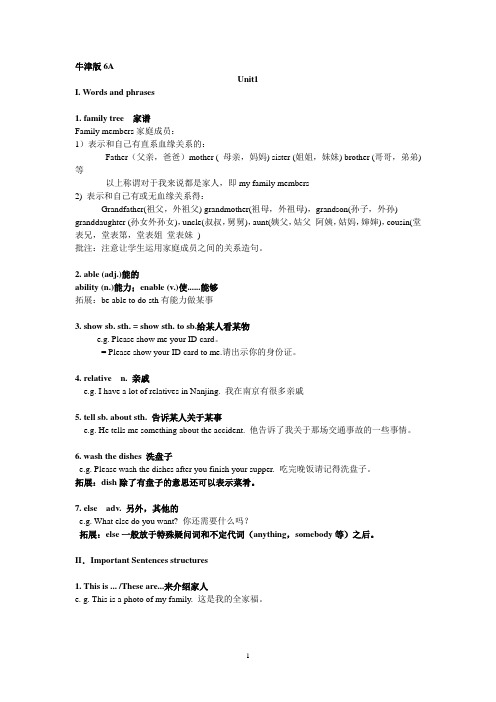
牛津版6AUnit1I. Words and phrases1. family tree 家谱Family members家庭成员:1)表示和自己有直系血缘关系的:Father(父亲,爸爸)mother ( 母亲,妈妈) sister (姐姐,妹妹) brother (哥哥,弟弟)等以上称谓对于我来说都是家人,即my family members2) 表示和自己有或无血缘关系得:Grandfather(祖父,外祖父) grandmother(祖母,外祖母),grandson(孙子,外孙) granddaughter (孙女外孙女),uncle(叔叔,舅舅),aunt(姨父,姑父阿姨,姑妈,婶婶),cousin(堂表兄,堂表第,堂表姐堂表妹)批注:注意让学生运用家庭成员之间的关系造句。
2. able (adj.)能的ability (n.)能力;enable (v.)使......能够拓展:be able to do sth有能力做某事3. show sb. sth. = show sth. to sb.给某人看某物e.g. Please show me your ID card。
= Please show your ID card to me.请出示你的身份证。
4. relative n. 亲戚e.g. I have a lot of relatives in Nanjing. 我在南京有很多亲戚5. tell sb. about sth. 告诉某人关于某事e.g. He tells me something about the accident. 他告诉了我关于那场交通事故的一些事情。
6. wash the dishes 洗盘子e.g. Please wash the dishes after you finish your supper. 吃完晚饭请记得洗盘子。
拓展:dish除了有盘子的意思还可以表示菜肴。
上海版牛津英语6A知识点整理
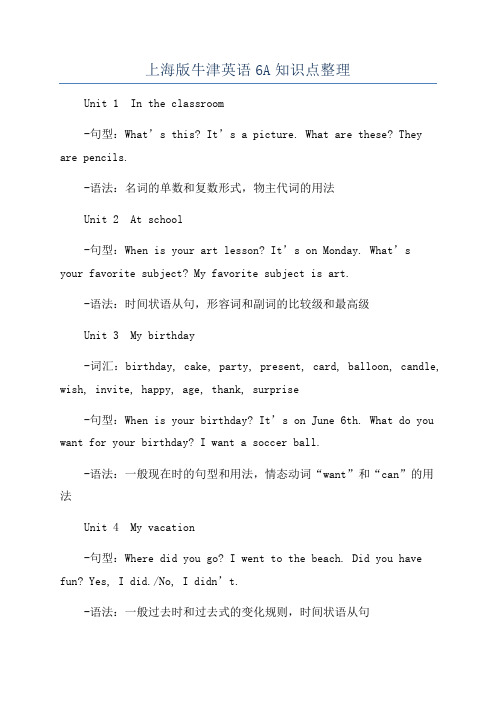
上海版牛津英语6A知识点整理Unit 1 In the classroom-句型:What’s this? It’s a picture. What are these? They are pencils.-语法:名词的单数和复数形式,物主代词的用法Unit 2 At school-句型:When is your art lesson? It’s on Monday. What’syour favorite subject? My favorite subject is art.-语法:时间状语从句,形容词和副词的比较级和最高级Unit 3 My birthday-词汇:birthday, cake, party, present, card, balloon, candle, wish, invite, happy, age, thank, surprise-句型:When is your birthday? It’s on June 6th. What do you want for your birthday? I want a soccer ball.-语法:一般现在时的句型和用法,情态动词“want”和“can”的用法Unit 4 My vacation-句型:Where did you go? I went to the beach. Did you have fun? Yes, I did./No, I didn’t.-语法:一般过去时和过去式的变化规则,时间状语从句Unit 5 Animals and plants-词汇:animal, plant, kangaroo, elephant, lion, tiger, monkey, panda, parrot, snake, butterfly, grass, flower, tree, forest-句型:What can parrots do? They can fly and talk. What are pandas’ favorite food? Their favorite food is bamboo.-语法:情态动词“can”的用法,描述事物的特征和能力Unit 6 In the garden-词汇:garden, vegetable, tomato, carrot, radish, onion, potato, cucumber, cabbage, turnip-句型:What can you see in the garden? I can see tomatoes, carrots, and onions. What’s your favorite vegetable? My favorite vegetable is cucumber.-语法:复数形式的可数名词Unit 7 We’re going to the zoo-词汇:zoo, lion, panda, monkey, kangaroo, tiger, bear, elephant, snake, ostrich, tortoise-句型:What are you going to do? We’re going to the zoo. Can snakes fly? No, they can’t.-语法:be going to表示将来的句型和用法,否定词can’t的用法Unit 8 On the farm-词汇:farm, pig, horse, sheep, chicken, cow, duck, dog, cat, lamb, chick, puppy, kitten-句型:How many pigs are there? There are three pigs.What’s your favorite farm animal? My favorite farm animal is a horse.-语法:数词和名词的复数形式Unit 9 At the supermarket-词汇:supermarket, mall, shop, store, grocery, bread, egg, cheese, juice, milk, butter, tea, coffee, sugar, salt-句型:What do you want to buy? I want to buy some bread. How much is the milk? It’s twenty yuan.-语法:不可数名词的用法,询问物品价格的句型和用法Unit 10 Clothes-词汇:clothes, hat, shirt, T-shirt, dress, skirt, pants, shorts, socks, shoes, coat, gloves, watch, scarf-句型:What are you wearing? I am wearing a hat, a T-shirt, and shorts. How much are the shoes? They are fifty yuan.-语法:指示代词和指示形容词,描述衣物的材料和颜色Unit 11 Our body-词汇:body, head, face, hair, eye, nose, mouth, ear, hand, arm, leg, foot, finger, toe-句型:What can you do with your hands? I can write and draw with my hands. How many fingers do you have? I have ten fingers.-语法:名词所有格的用法,询问数量和回答数量的句型以上是上海版牛津英语6A教材中的部分重要知识点的整理。
上海牛津英语6上笔记
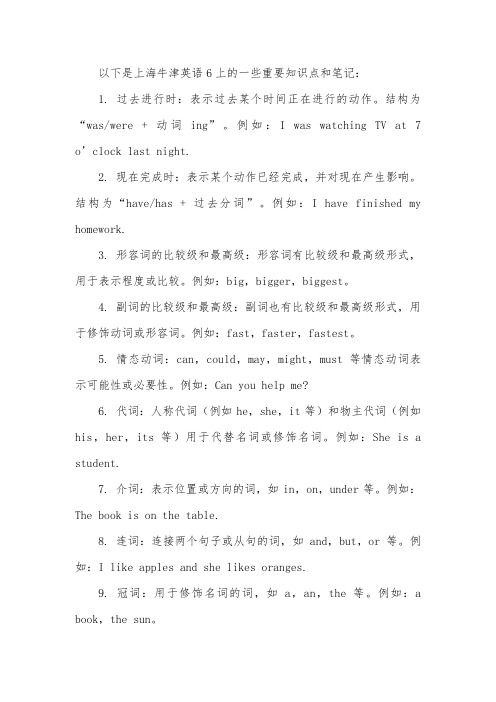
以下是上海牛津英语6上的一些重要知识点和笔记:1. 过去进行时:表示过去某个时间正在进行的动作。
结构为“was/were + 动词ing”。
例如:I was watching TV at 7 o’clock last night.2. 现在完成时:表示某个动作已经完成,并对现在产生影响。
结构为“have/has + 过去分词”。
例如:I have finished my homework.3. 形容词的比较级和最高级:形容词有比较级和最高级形式,用于表示程度或比较。
例如:big,bigger,biggest。
4. 副词的比较级和最高级:副词也有比较级和最高级形式,用于修饰动词或形容词。
例如:fast,faster,fastest。
5. 情态动词:can,could,may,might,must等情态动词表示可能性或必要性。
例如:Can you help me?6. 代词:人称代词(例如he,she,it等)和物主代词(例如his,her,its等)用于代替名词或修饰名词。
例如:She is a student.7. 介词:表示位置或方向的词,如in,on,under等。
例如:The book is on the table.8. 连词:连接两个句子或从句的词,如and,but,or等。
例如:I like apples and she likes oranges.9. 冠词:用于修饰名词的词,如a,an,the等。
例如:a book,the sun。
10. 动词不定式:动词不定式是“to + 动词原形”的结构,表示未完成的动作或计划。
例如:to go,to see。
上海版牛津英语6A知识点整理
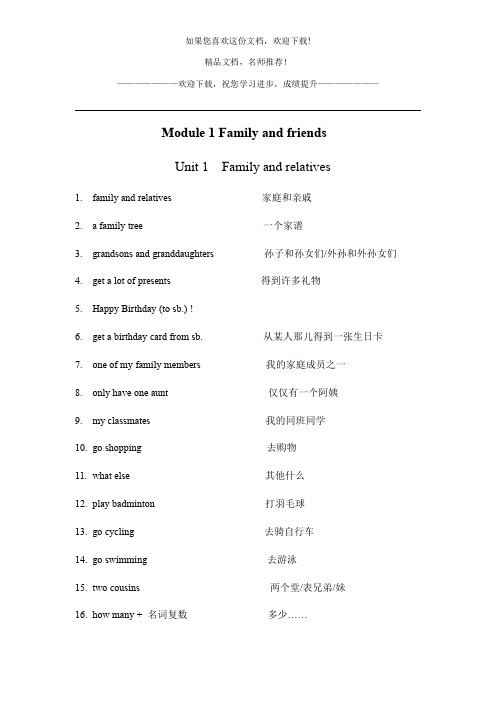
———————欢迎下载,祝您学习进步,成绩提升———————Module1Family and friendsUnit1Family and relatives1.family and relatives家庭和亲戚2.a family tree一个家谱3.grandsons and granddaughters孙子和孙女们/外孙和外孙女们4.get a lot of presents得到许多礼物5.Happy Birthday(to sb.)!6.get a birthday card from sb.从某人那儿得到一张生日卡7.one of my family members我的家庭成员之一8.only have one aunt仅仅有一个阿姨9.my classmates我的同班同学10.go shopping去购物11.what else其他什么12.play badminton打羽毛球13.go cycling去骑自行车14.go swimming去游泳15.two cousins两个堂/表兄弟/妹16.how many+名词复数多少……———————欢迎下载,祝您学习进步,成绩提升———————语言点1.This is my grandfather.这是我的(外)祖父。
These are my family and relatives.这些是我的家人和亲戚。
注意句中各成分保持单复数同形。
2.I?m their son..我是他们的儿子。
We?re their sons.我们是他们的儿子。
3.How many uncles do you have?你有多少个叔叔?How many后面接可数名词的复数形式。
4.What do you do with your…?你和你的…干什么?5.What else do you do with your…?你和你的…还干什么?6.What else do you do with your…?你和你的…还干什么?With是个介词,后面接人称代词时,要用宾格的形式。
上海版牛津英语六年级(上下)全重点知识点复习整理

上海版牛津英语六年级(上下)全重点知识点复习整理上海版牛津英语六年级(上、下)全重点知识点复习整理上海牛津英语六年级上下册全知识点梳理频度副词always/sometimes/usually/never是频度副词,提问应该要用howoften??在句中的边线就是:放到犯罪行为动词的前面,放到be动词的后面。
也可以说道“行前系后”。
e.gsheisalwayskind.她总是很正直的。
shealwayshelpsotherpeople.她总是帮助其他人。
不能出现这样的句子:sheisalwayshelpsotherpeople.(×)一句话中无法同时发生两个动词。
并且必须特别注意主谓保持一致,尤其特别注意第三人称单数不可以忽略。
howoften与howmanytimeshowoften回答“频率次数+时间范围”howmanytimes回答“频率次数”e.g.―howoftendoyouexercise?―twiceaweek.―howmanytimeshaveyoubeenthere?―twice.副词则表示动作特征或性状特征。
通常用以形容或润色除了名词和代词以外的词,主要润色形容词、动词、其他副词和句子。
helooksveryhappy.(润色形容词)theoldladyiswalkingslowlynow.(修饰动词)luckily,hegotthefirstprize.(修饰句子)形容词后面+ly构成副词:slow―slowlyslight―slightlyquick―quicklycareful―carefullyfierce―fiercelyim mediate―immediatelygentle―gentlylucky―luckilyhappy―happily介词whatelsedoyoudowithyour??你和你的?还干什么?with就是个介词,后面直奔人称代词时,必须用宾格的形式。
上海英语牛津六年级知识点

上海英语牛津六年级知识点上海英语牛津六年级课程旨在帮助学生巩固和扩展他们的英语知识和技能。
以下是上海英语牛津六年级的一些重要知识点。
1. 语法知识在牛津六年级英语课程中,学生将深入学习各种语法知识,包括时态、语态、从句、短语结构等。
1.1 时态学生将学习各种时态,例如一般现在时、一般过去时、一般将来时、现在进行时、过去进行时等。
他们将学习如何正确使用这些时态,并能根据上下文理解语句的时间关系。
1.2 语态学生将学习主动语态和被动语态的用法。
他们将学习如何转换句子的语态,并理解被动语态在不同语境中的应用。
1.3 从句学生将学习几种常见的从句,如名词性从句、定语从句和状语从句。
他们将学习如何正确构造和使用这些从句,以更好地表达自己的意思。
1.4 短语结构学生将学习一些常用的短语结构,如动词短语、介词短语和形容词短语。
他们将学习如何正确使用这些短语,并能在写作和口语中灵活应用。
2. 词汇和拼写在牛津六年级英语课程中,学生将扩展他们的词汇量,并提高他们的拼写能力。
以下是一些常见的词汇和拼写要点。
2.1 常见词汇学生将学习一些常见的词汇,如日常生活用语、动词、形容词、副词等。
他们将通过课堂练习和词汇表达活动来牢固掌握这些词汇。
2.2 拼写规则学生将学习一些拼写规则,如辅音字母重读闭音节词的变形规则、双写辅音字母规则等。
他们将通过拼写练习和拼写比赛来提高他们的拼写准确性。
3. 阅读理解阅读理解在牛津六年级英语课程中占有重要地位。
学生将学习如何从文字中获取信息,理解文章的主旨,推断意义等。
3.1 文章理解学生将学习如何快速浏览文章,并从中获取关键信息。
他们将学习如何确定文章的主旨,并通过答题来提升他们的文章理解能力。
3.2 推断意义学生将学习如何根据文章的上下文推断词语和短语的意义。
他们将通过阅读材料和探索词汇义项来提高他们的词汇推断能力。
4. 口语和听力在牛津六年级英语课程中,学生将加强他们的口语和听力能力。
上海牛津英语6A知识点总结
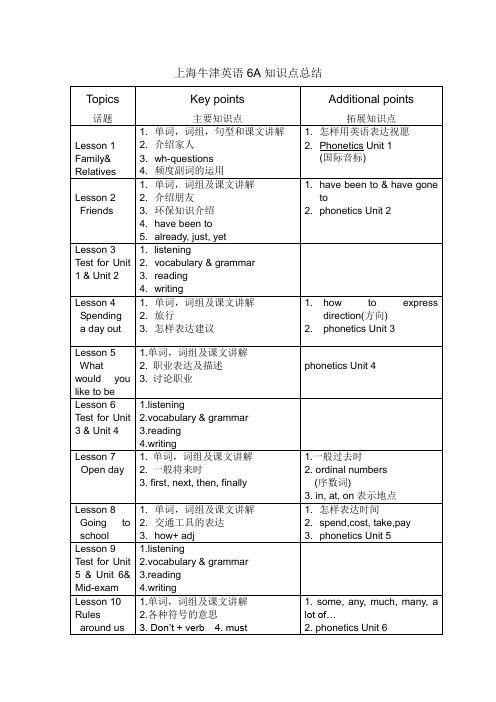
1.怎样表达时间
2.spend,cost, take,pay
3.phonetics Unit 5
Lesson 9
Test for Unit 5 & Unit 6& Mid-exam
1.listening
2.vocabulary & grammar
3.reading
4.writing
上海牛津英语6A知识点总结
Topics
话题
Key points
主要知识点
Additional points
拓展知识点
Lesson 1
Family& Relatives
1.单词,词组,句型和课文讲解
2.介绍家人
3.wh-questions
4.频度副词的运用
1.怎样用英语表达祝愿
2.PhoneticsUnit 1
Lesson 10
Rules around us
1.单词,词组及课文讲解
2.各种符号的意思
3. Don’t + verb 4. must
1. some, any, much, many, a lot of…
2. phonetics Unit 6
Lesson 11
The food we eat
1.单词,词组及课文讲解
Lesson 7
Open day
1.单词,词组及课文讲解
2.一般将来时
3. first, next, then, finally
1.一般过去时
2. ordinal numbers
(序数词)
3. in, at, on表示单词,词组及课文讲解
2.交通工具的表达
上海牛津版英语六年级第一学期6A期末复习知识点总结1

must not
必须、很重要或必要不准,不允许或禁止
Wemust study hard.
You mustn’t leave school alone.
提问
把情态动词单独提前
Must we wait foryou?Yes,youmust ; No,youneedn’t.(非mustn’t)
花钱花时间
.spen.tw.yua.o.thi.pen...spen.tw.yua.i.buyin.thi.pen.
I spend two yuan on this pen.=I spend two yuan in buying this pen.
表示提议的句型
Shall we
Shall是情态动词+接动词原形
a little
只能修饰不可数名词,a little milk.
some
a lot of plenty of
既可修饰可数名词又可修饰不可数名词。当及可数名词连用时,只能及可数名词的复数形式连用
k. Plent.o.eggs.
someeggs. a lot of milk. Plenty of eggs.
the one on the left/right , the one in the middle =the left/right/middle one.
地点、方位表述
near离**近
far(away)from离**(很)远
直接接地点
.liv.nea.school. H.live.fa.awa.fro.school.
六年级英语(上)知识点
频度副词
频度副词
always、sometimes、usually、never
牛津英语上海六年级知识点
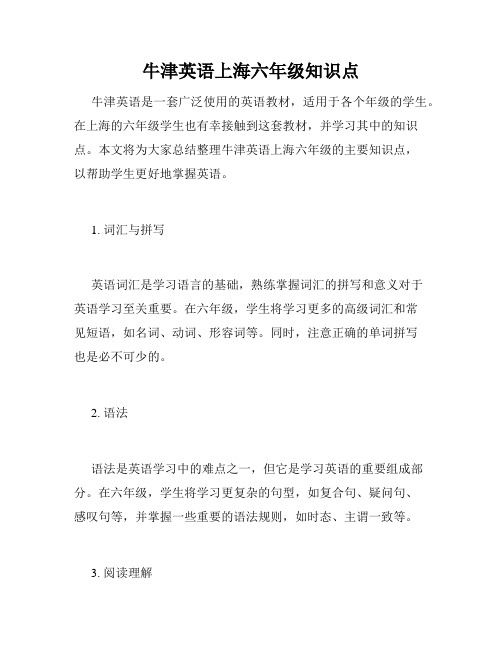
牛津英语上海六年级知识点牛津英语是一套广泛使用的英语教材,适用于各个年级的学生。
在上海的六年级学生也有幸接触到这套教材,并学习其中的知识点。
本文将为大家总结整理牛津英语上海六年级的主要知识点,以帮助学生更好地掌握英语。
1. 词汇与拼写英语词汇是学习语言的基础,熟练掌握词汇的拼写和意义对于英语学习至关重要。
在六年级,学生将学习更多的高级词汇和常见短语,如名词、动词、形容词等。
同时,注意正确的单词拼写也是必不可少的。
2. 语法语法是英语学习中的难点之一,但它是学习英语的重要组成部分。
在六年级,学生将学习更复杂的句型,如复合句、疑问句、感叹句等,并掌握一些重要的语法规则,如时态、主谓一致等。
3. 阅读理解阅读理解是培养学生阅读能力和理解能力的重要途径之一。
在六年级,学生将进行更高难度的阅读练习,例如阅读短文并回答问题、填空等。
通过这些练习,学生可以提高自己的阅读技巧和阅读速度,并从中获取信息。
4. 听力听力是英语学习的重要组成部分,也是日常交流中必备的技能。
在六年级,学生将继续进行听力训练,通过听力练习,学生可以提高自己的听力理解能力,同时也可以学习和熟悉更多的英语口语表达方式。
5. 写作写作是英语学习的综合技能之一,通过写作,学生可以更好地表达自己的思想和观点。
在六年级,学生将学习书写更加完整和有条理的短文,以及描述人物、事件等。
同时,学生也需要关注文章的结构和连贯性,使写作更具逻辑性和可读性。
总结起来,牛津英语上海六年级的知识点主要包括词汇与拼写、语法、阅读理解、听力和写作。
通过系统学习和练习,学生可以全面提高自己的英语水平,为将来的学习打下坚实的基础。
上海牛津英语六年级英语知识点整理

一、基础语法知识点:
1.句子的构成:主语+谓语+宾语;
2.时态的正确使用:一般现在时、一般过去时、一般将来时等;
3.动词的正确形式及用法:及物动词、不及物动词、系动词等;
4.祈使句的用法:表示请求、命令、建议等;
5.被动语态的用法:一般现在时、一般过去时、一般将来时等;
6. 句子的否定形式:用not把动词或动词短语置于句子前;
7. 祈使句的否定形式:用don’t/doesn’t let +主语+动词原形;
8. 情态动词should、would的用法:表示建议、意愿等;
9.特殊疑问句的构成:疑问词+一般疑问句的构成;
10.形容词、副词的比较级和最高级形式:用于表示物体之间的比较;
11. 名词性从句的引导词:what、who、which等;
12.过去进行时的用法;
二、词汇知识点:
1.常用名词、动词、形容词、副词的基本词义和用法;
2.常见的固定搭配、短语和习惯用法;
3.数词、时间词、量词的用法;
4.常用介词和介词短语的用法;
5.记录、理解并使用常用的固定句型和表达方式;
三、阅读技巧:
1.能够理解并提取文本中的关键信息;
2.能够根据文本内容进行推测和判断;
3.能够根据问题选择正确的答案;
4.能够理解并使用上下文线索;
5.能够根据语境理解单词和短语的意思;
四、写作技巧:
1.能够用正确的语法和用词写出简单连贯的句子;
2.能够运用所学的句型和句式进行书面表达;
3.能够用英语写简单的对话、日记、邮件等;
4.能够根据要求写出简单的说明文、记叙文等;。
牛津上海版 六年级第一学期英语考点汇总
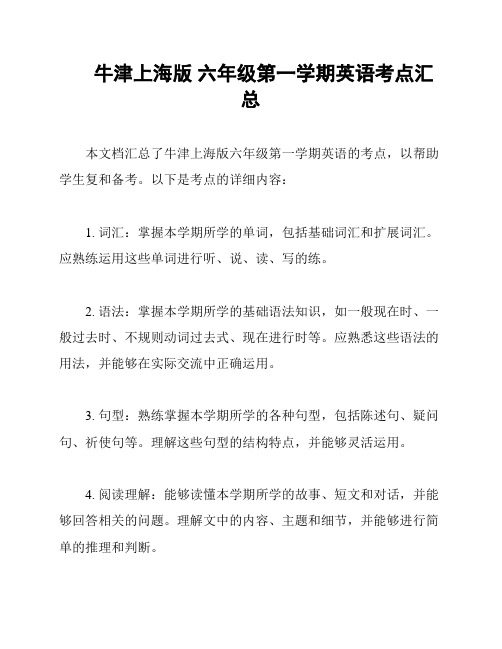
牛津上海版六年级第一学期英语考点汇
总
本文档汇总了牛津上海版六年级第一学期英语的考点,以帮助学生复和备考。
以下是考点的详细内容:
1. 词汇:掌握本学期所学的单词,包括基础词汇和扩展词汇。
应熟练运用这些单词进行听、说、读、写的练。
2. 语法:掌握本学期所学的基础语法知识,如一般现在时、一般过去时、不规则动词过去式、现在进行时等。
应熟悉这些语法的用法,并能够在实际交流中正确运用。
3. 句型:熟练掌握本学期所学的各种句型,包括陈述句、疑问句、祈使句等。
理解这些句型的结构特点,并能够灵活运用。
4. 阅读理解:能够读懂本学期所学的故事、短文和对话,并能够回答相关的问题。
理解文中的内容、主题和细节,并能够进行简单的推理和判断。
5. 听力理解:能够听懂本学期所学的对话、问答和短文,并能
够回答相关的问题。
理解听力材料中的信息、关键词和上下文,并
能够从中获取必要的信息。
6. 书写能力:书写要规范、清晰、工整。
应注意字母的大小写、大小比例和书写流畅度。
能够正确书写所学的单词、短语和句子。
7. 口语表达:能够运用所学的句型和词汇进行口语交流。
应注
意语音语调的准确性和自然流利度。
能够表达自己的观点、描述事
物和表达意愿。
希望通过对以上考点的复和总结,学生们能够在英语考试中取
得好成绩。
祝大家好运!
(Word count: 195)。
- 1、下载文档前请自行甄别文档内容的完整性,平台不提供额外的编辑、内容补充、找答案等附加服务。
- 2、"仅部分预览"的文档,不可在线预览部分如存在完整性等问题,可反馈申请退款(可完整预览的文档不适用该条件!)。
- 3、如文档侵犯您的权益,请联系客服反馈,我们会尽快为您处理(人工客服工作时间:9:00-18:30)。
Module 1 Family and friendsUnit 1 Family and relatives1.family and relatives 家庭和亲戚2. a family tree 一个家谱3.grandsons and granddaughters 孙子和孙女们/外孙和外孙女们4.get a lot of presents 得到许多礼物5.Happy Birthday (to sb.) ! 生日快乐!6.get a birthday card from sb. 从某人那儿得到一张生日卡7.one of my family members 我的家庭成员之一8.only have one aunt 仅仅有一个阿姨9.my classmates 我的同班同学10.go shopping 去购物11.what else 其他什么12.play badminton 打羽毛球13.go cycling 去骑自行车14.go swimming 去游泳15.two cousins 两个堂/表兄弟/妹16.how many + 名词复数多少……语言点1. This is my grandfather.这是我的(外)祖父。
These are my family and relatives.这些是我的家人和亲戚。
注意句中各成分保持单复数同形。
2. I‟m their son.. 我是他们的儿子。
We‟re their sons.我们是他们的儿子。
3. How many uncles do you have?你有多少个叔叔?How many后面接可数名词的复数形式。
4. What do you do with your…?你和你的…干什么?5. What else do you do with your…?你和你的…还干什么?6. What else do you do with your…?你和你的…还干什么?With是个介词,后面接人称代词时,要用宾格的形式。
With me/him/her/it/us /them7. always/sometimes/usually是频度副词,提问应该要用How often…?Unit 2 I have a good friend1.help each other 互相帮助2.help other people = help others 帮助别人3.not…at all 根本不4.go out at night 在晚上出去5.like to be together 喜欢在一起6.walk to school together 一起走去学校7.be friendly 友好的8.be helpful 有帮助的9.work hard = study hard 努力学习10.be late for school 上学迟到11.get angry 变得生气12.be kind to others 对别人友善的13.share sth. with sb. 和某人分享某物14.be never naughty 从不淘气15.never tell a lie/lies 从不说谎16.a visit to sp. 一次去某地的参观17.live in the USA = live in America 居住在美国18.visit sp. for the first time 第一次参观某地19.ask sb. about sth. 询问某人关于某事20.have/has been to sp. 曾去过某地21.Ocean Park 海洋公园22.Garden City Zoo 花园城市公园23.Water World 水上世界24.Friends of the Earth 地球的朋友25.look after = take care of 照顾,照看26.look after the environment 照顾环境27.all the things round us 我们周围所有的东西28.pollute the air 污染空气29.air pollution 空气污染30.water pollution 水污染nd pollution 陆地污染32.keep sth. clean 保持某物干净33.pick up 捡起,拾起34.put rubbish into rubbish bins 把垃圾放入垃圾箱35.tell sb. to do sth. 告诉某人做某事36.tell sb. not to do sth. 告诉某人不要做某事37.leave rubbish 留下垃圾38.want to be/become 想要成为39.want to do sth. 想要做某事40.promise to do sth. 承诺做某事41.promise not to do sth. 承诺不要做某事42.our promises 我们的承诺43.discuss sth. with sb. 和某人讨论某事44.reuse shopping bags 再使用购物袋45.What about/How about sth./doing…? ……怎么样?语言点:1.always/sometimes/usually/never 是频度副词.在句中的位置是:放在行为动词的前面,放在be动词的后面。
也可以说“行前系后”。
She is always kind.她总是很善良的。
She always helps other people.她总是帮助其他人。
不能出现这样的句子:She is always helps other people.(×)一句话中不能同时出现两个动词。
并且要注意主谓保持一致,尤其注意第三人称单数不可以忽略。
2.They like to be together.他们喜欢在一起。
like to do sth.=like doing sth.喜欢做某事He likes to play football.=He likes playing football.他喜欢踢足球。
3.She can‟t read or write.她既不会读也不会写。
or用在否定句中表平列关系。
and用在肯定句中表平列关系。
She can read and write.她既会读又会写。
4. help each other互相帮助5. other people=others其他人6. be kind to sb.对某人很友好7. tell a lie = tell lies说谎8. share sth. with sb.和某人分享某物She shares her bread with me .她把她的面包分给了我。
9. in the USA在美国USA要大写。
10. for the first time第一次11. on Saturday具体的某一天介词用on12. Have you been to …..yet?你去过…..吗?Yes, I have already/just been to…./been there.是的,我已经去过了。
No, I haven‟t been to …/been there yet.不,还没有去过。
already/just用于肯定句中。
yet用于否定和疑问句中。
Unit 3 Spending a day out together1.spend a day out together 一起在外度过一天2.on Green Island 在绿岛上3.in Happy Town 在快乐城4.in Dragon Bay 在龙湾5.on Lucky Island 在幸运岛上6.at weekends = at the weekend 在周末7.be near sp. 离开某地近的8.be far (away) from sp 离开某地远的9.Seaside Town 海边镇10.a photo of my family and me 一张我家人和我的照片11.have lunch together 一起吃午饭12.Green Market 格林市场13.In Sunny Town 在太阳城14.Space Museum 太空博物馆15.In Moon Town 在月亮城16.an activity 一项活动17.have a barbecue 进行一次烧烤18.fly kites 放风筝19.ride bicycles 骑自行车20.make sandcastles 筑沙堡21.collect shells 收集贝壳22.make an album 制作一本照片簿23.plan to do sth. 计划做某事24.a good idea 一个好主意25.which place 哪一个地方26.plan a trip 计划一次旅行27.How about………怎么样?(常用于表示建议或提议)28.be going to + v. 打算做…语言点:1. at weekends= at the weekend在周末2. near/ far away from离….近/远near后直接接地点名词3. Where have you been in….?你去了….哪个地方?I have been to….in /on…我去了….Where have you been in Shanghai?你到过上海哪里?I have been to Century Park in Shanghai.我到过上海的世纪公园。
6.a photo of my brother and me 一张我哥和我的照片。
a photo of后接人称代词时,应该用宾格形式a photo of me/him/her/it/us /them7. be +V-ing 表现在进行时8. cost以物作主语,通常是问价钱Take以it作主语。
通常是花费时间It takes me 15 minutes to go to school.Spend 以人作主语,既可以是花费金钱,也可以是花费时间。
Spend time/money on sth. spend time/money in doing sth. I spend two yuan on thispen.=I spend two yuan in buying this pen.9.Which place shall we visit?我们将参加哪个地方?10.When are we going to come back?我们将什么时候回来?Come back回来Be going to 表将来begoing to=will 11. How are we going to get there?我们将怎样到达哪里?How对交通工具进行提问。
